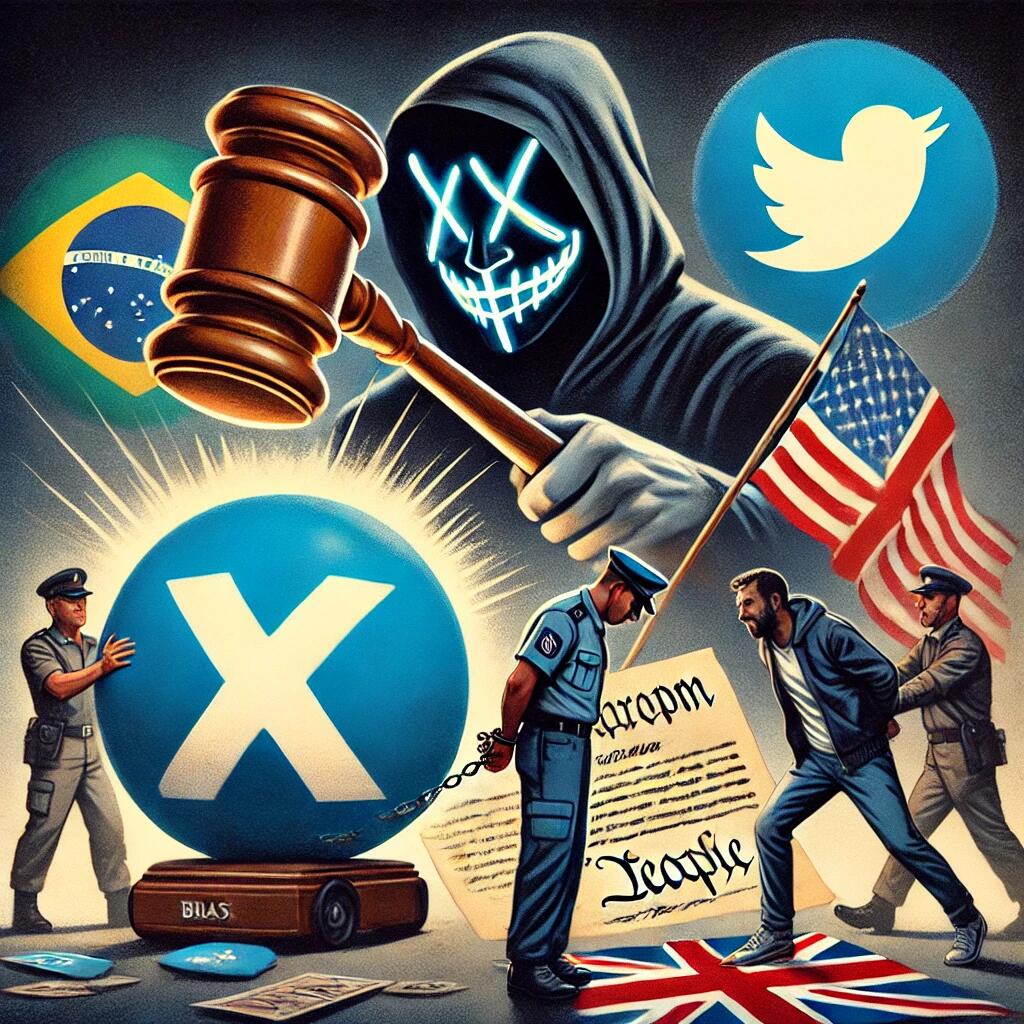In recent years, the fundamental right to free speech has come under increasing attack around the world. Governments are tightening their grip on the flow of information, targeting social media platforms and their executives in an attempt to control the narrative and silence dissent. Recent events in Brazil, France, and the United Kingdom highlight a troubling trend that threatens not just free speech, but the very foundation of democratic society.
Brazil: Banning X Across the Country
In a move that has shocked the world, Brazil's Chief Judge Alexandre de Moraes has ordered the nationwide suspension of the social media platform X (formerly Twitter). The decision came after X refused to comply with Brazilian court orders to remove specific content deemed harmful by the government and to appoint a legal representative in the country. This unprecedented action is seen by many as an effort to stifle free speech and control the flow of information within Brazil.
X, under the ownership of Elon Musk, has been a platform for diverse voices and opinions, often challenging government narratives and exposing corruption. By banning X, Brazil's judiciary is effectively cutting off a major avenue for public discourse, leaving millions without a critical platform to express their views. The move has sparked widespread outrage, with critics accusing the Brazilian government of authoritarian overreach and censorship.
The ban on X is a clear example of how governments can use their power to suppress free speech, particularly when it threatens their control. It raises alarming questions about the future of free expression in Brazil and sets a dangerous precedent for other nations considering similar actions.
France: Arresting the CEO of Telegram
In France, the assault on free speech has taken a different, but equally concerning form. The French government recently arrested Pavel Durov, the CEO of Telegram, a messaging app known for its strong encryption and commitment to user privacy. The arrest is part of a broader crackdown on platforms that resist government demands to monitor and control online content.
Telegram has become a refuge for those seeking to communicate privately and securely, away from the prying eyes of government surveillance. However, this has made it a target for authorities who argue that such platforms are being used to spread disinformation and organize protests. The arrest of Durov is a stark warning to other tech executives: comply with government demands, or face the consequences.
This move by France is particularly troubling because it strikes at the heart of digital privacy and the right to communicate freely. By arresting the CEO of a platform that prioritizes user privacy, France is sending a message that it is willing to sacrifice individual freedoms in the name of national security. This raises serious concerns about the future of free speech and digital rights in Europe and beyond.
The United Kingdom: Threatening Americans with Arrest for Using the First Amendment
Perhaps the most egregious example of the global crackdown on free speech comes from the United Kingdom, where American citizens are being threatened with arrest for exercising their First Amendment rights. The UK government has increasingly targeted individuals who publish content online that is legal in the United States but violates the UK's stricter hate speech and defamation laws.
One high-profile case involves American commentators and activists who have been warned that they could face arrest if they travel to the UK, due to content they posted online. These individuals are being targeted for exercising their right to free speech under the First Amendment, a right that is enshrined in the U.S. Constitution but not recognized in the same way in the UK.
This extraterritorial application of UK law is a direct challenge to the sovereignty of the United States and the rights of its citizens. It represents a chilling attempt to export censorship across borders, effectively punishing Americans for exercising their constitutionally protected rights. The implications of this are profound, as it sets a precedent for other countries to pursue similar actions against individuals who dare to speak out against the status quo.
A Global Assault on Free Speech
The actions of Brazil, France, and the United Kingdom are part of a broader global trend toward the erosion of free speech. Whether through the outright banning of platforms, the arrest of tech executives, or the extraterritorial enforcement of speech laws, governments are increasingly willing to go to extreme lengths to control what can and cannot be said.
This assault on free speech is not just a threat to the individuals and platforms being targeted; it is a threat to democracy itself. Free speech is the cornerstone of a free society, allowing citizens to hold their governments accountable, express dissenting opinions, and engage in open debate. Without it, the very fabric of democracy begins to unravel.
As these attacks on free speech continue, it is crucial for citizens, activists, and governments to push back. Defending the right to free expression is not just about protecting individual rights—it is about safeguarding the future of democracy and ensuring that the voices of the people are heard. The global community must stand together in defense of free speech, resisting efforts to silence dissent and control the narrative. The future of our freedoms depends on it.

